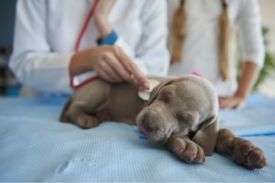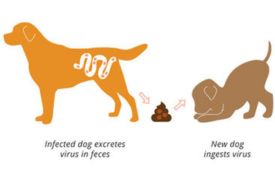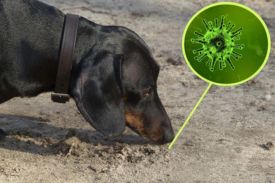Do you ever wonder how dogs get Parvo? It may seem like a cruel coincidence, but this highly contagious virus can be transmitted to our furry friends in several ways.
Parvo, short for canine Parvovirus, is a serious illness that affects dogs of all ages, particularly puppies. One common way dogs contract this virus is through contaminated feces. When infected waste is left in the environment, it can survive for months and easily infect other dogs who come into contact with it.
Additionally, direct contact with an infected dog can spread the virus and maternal transmission from an infected mother to her puppies. Recognizing the symptoms of Parvo and seeking veterinary care promptly is crucial for treatment and recovery.
By understanding how dogs get this virus and taking preventative measures such as vaccinations and proper hygiene practices, we can minimize the risk of infection and keep our beloved pets healthy and happy.
Key Takeaways
- Parvo is highly contagious and can be transmitted through contaminated feces, direct contact with infected dogs, or maternal transmission from infected mothers to their puppies.
- Vaccination is crucial in preventing parvo outbreaks and protecting dogs from infection.
- Proper hygiene practices, such as regular disinfection of living areas and toys, can help minimize the risk of this virus infection.
- Prompt veterinary care is essential for early diagnosis and treatment of Parvo, increasing the chances of recovery.
What is Parvo and How Does it Affect Dogs?

Parvo is a highly contagious virus that can swiftly attack your dog’s immune system, causing severe gastrointestinal distress and potentially leading to death. It’s important to understand the impact of this virus on the dog population and take necessary precautions for parvo prevention.
Parvo primarily spreads through contact with infected feces or contaminated environments. Dogs can easily contract the virus by sniffing or licking surfaces that have been contaminated. Additionally, it can be transmitted through direct contact with an infected dog.
The virus targets rapidly dividing cells in a dog’s body, particularly the intestines and bone marrow. This leads to vomiting, diarrhea (often bloody), lethargy, loss of appetite, and dehydration.
Given its high contagion rate and severity, this virus can quickly spread within a community of dogs if proper precautions are not taken. Vaccination plays a crucial role in preventing virus outbreaks and protecting the overall well-being of our furry friends.
Ensuring all dogs receive their vaccinations and practicing good hygiene habits can significantly reduce the risk of this virus infection and its devastating consequences on the dog population.
How Do Dogs Can Get Parvo from Infected Waste

Imagine walking through a beautiful park, oblivious to the invisible landmines of infectious waste that could turn your furry friend into a ticking time bomb of illness and despair. Understanding how dogs can contract Parvo from infected debris is important to prevent this nightmare scenario.
Here are some key points to consider:
- Always pick up after your dog: By promptly disposing of their waste, you help reduce the risk of spreading the virus.
- Use proper cleaning methods: Regularly disinfect areas where infected dogs have been, as the virus can survive in the environment for months.
- Keep your dog away from contaminated areas: Avoid places where infected dogs may have defecated, such as public parks or dog runs.
- Vaccinate your dog: This is crucial in preventing viruses and protecting them from potential infection.
- Educate others about virus prevention: Spread awareness within your community to ensure everyone understands the importance of responsible pet ownership.
By following these guidelines and taking necessary precautions, we can work together to protect our beloved pets from this devastating disease.
How Parvo Can Survive in the Environment and Infect Dogs

Walking through contaminated environments, such as public parks or dog runs, can unknowingly expose your furry friend to the lasting effects of this resilient virus. This virus is a highly contagious disease that can survive in the environment for months, making it easy for dogs to become infected.
The virus is shed in the feces of infected dogs and can contaminate soil, grass, and other surfaces where dogs walk or play. Even a small amount of infected feces can contain millions of viral particles capable of infecting healthy dogs.
Practicing good hygiene and taking necessary precautions is important to prevent this virus transmission and protect your dog. This includes regularly disinfecting areas where your dog spends time, promptly cleaning up after them, and avoiding contact with potentially contaminated objects or surfaces.
Proactively preventing environmental contamination can help protect your beloved pet from Parvo’s harmful effects.
| Prevention Tips | Environmental Contamination Symptoms |
|---|---|
| Vaccinate your dog | Vomiting |
| Practice good hygiene | Diarrhea |
| Avoid contact with infected animals | Lethargy |
How Dogs Can Contract Parvo from Infected Dogs
Fido may contract Parvo if he comes into contact with an infected canine. Awareness of the risks is important, especially when taking your furry friend to dog grooming salons or parks.
These environments can be hotspots for the spread of this virus because infected dogs shed the virus in their feces and vomit, contaminating the area. When Fido sniffs or licks contaminated surfaces, he can easily pick up the virus.
Direct contact with an infected dog through nose-to-nose greetings or sharing food and water bowls can also lead to transmission. So, it’s crucial to ensure that any communal areas where dogs interact are properly cleaned and disinfected to prevent the spread of this dangerous virus and keep our beloved pets safe and healthy.
How Puppies Can Inherit Parvo from Infected Mothers
Maternal transmission of this virus occurs when infected mothers pass the virus onto their puppies during pregnancy or through nursing. It is heartbreaking and can lead to severe illness and even death in newborn pups. However, there are measures you can take to protect your furry friends from this devastating disease.
Inherited immunity is crucial in preventing this virus transmission from mother to puppies. Puppies receive antibodies from their mothers through colostrum, the first milk produced after birth. These antibodies temporarily protect against the virus until the puppies’ immune systems fully develop.
To ensure proper prevention, it is essential to vaccinate pregnant dogs before they give birth. This helps guarantee they have sufficient protective antibodies for their offspring. Additionally, maintaining a clean environment for both mother and puppies is key. Regular disinfection of bedding, toys, and living areas can help minimize the risk of infection.
By understanding how maternal transmission works and taking preventive measures, you can protect your beloved furry family members from the dangers of this virus.
How Vaccines Can Protect Dogs from Parvo
Vaccines are like a superhero shield, protecting our furry companions from the invisible villain of Parvo. They stimulate the dog’s immune system to recognize and fight off the virus.
Vaccination is crucial in preventing this deadly disease, as it significantly reduces the risk of infection and helps maintain a healthy population of dogs. The effectiveness of vaccines can vary depending on factors such as the type of vaccine used and proper administration.
However, when enough dogs in a community are vaccinated, it creates what’s known as herd immunity. This means that even if some dogs aren’t vaccinated or have a weaker response to the vaccine, they’re less likely to contract Parvo because most of the population is protected.
So remember, getting your dog vaccinated not only protects them but also contributes to safeguarding other dogs in your community against this virus.
How to Recognize Parvo in Dogs and Seek Veterinary Care
Spotting the signs of this virus in your furry friend is crucial for seeking immediate veterinary care. Here are some key symptoms to watch out for:
- Vomiting: If your dog starts vomiting frequently or suddenly loses appetite, it could signify Parvo.
- Diarrhea: Parvo often leads to severe diarrhea, which may contain blood or have a strong foul odor.
- Lethargy: A noticeable decrease in energy levels or reluctance to play and engage in normal activities can indicate Parvo.
- Dehydration: This virus causes excessive fluid loss, so if your dog becomes dehydrated, you may notice sunken eyes or dry gums.
If you observe any of these symptoms, it’s essential to seek veterinary care immediately. Remember that early diagnosis and treatment greatly increase the chances of recovery. Your veterinarian will perform tests to confirm if it’s indeed Parvo and provide appropriate medical intervention.
By recognizing these symptoms and acting swiftly, you can help save your beloved pet from the devastating effects of the virus.
How Dogs with Parvo Can Be Treated and Nurse Back to Health
Treating and nursing back to health a dog infected with this virus is a challenging but crucial process that requires immediate veterinary intervention. The treatment options for dogs with Parvo include hospitalization, intravenous fluids, and medications to control vomiting and diarrhea.
The recovery process can be lengthy and requires close monitoring by the veterinarian. Keeping the dog clean and providing supportive care, such as nutritional support, pain management, and antibiotics, if necessary, is important.
Your veterinarian will guide you through this process, providing detailed instructions on caring for your sick pup at home. It’s essential to follow these instructions carefully to ensure the best chance of recovery.
Remember, patience and dedication are key during this difficult time, but with proper treatment and care, your furry friend can overcome this virus and return to good health.
Tips to Minimize the Risk of Parvo Infection in Dogs
Now that you know how dogs can be treated and nursed back to health from this virus, let’s focus on preventing this disease altogether. Taking steps to minimize the risk of parvo infection in your beloved furry friend is crucial. You can ensure their safety and well-being by following simple prevention tips.
To help you remember these essential tips, I have prepared a handy table for you:
| Prevention Tips | Explanation |
|---|---|
| Vaccinate | Ensure your dog receives regular vaccinations |
| Limit exposure | Keep your dog away from potentially infected areas |
| Practice good hygiene | Clean your dog’s living space regularly |
By implementing these preventative measures, you actively care for your dog’s health and reduce their chances of contracting Parvo. Remember, prevention is always better than cure!
Educating Others about Parvo and its Prevention Measures
Please spread the word and educate others about how to prevent the spread of Parvo and keep their furry friends safe and healthy. Raising awareness is crucial in stopping the transmission of this deadly disease.
Educating people around you can help them understand the importance of hygiene in preventing parvo infections. Remind them to regularly clean their dog’s living areas, including bedding, toys, and food bowls.
Please encourage them to practice good hand hygiene by washing their hands thoroughly after handling dogs or any potentially contaminated items. Stress the significance of avoiding contact with infected dogs or contaminated environments.
It’s also essential for pet owners to ensure that their dogs receive all necessary vaccinations on time. By spreading awareness and emphasizing proper hygiene practices, we can work together to protect our four-legged companions from Parvo’s devastating effects.
Frequently Asked Questions
Can humans contract Parvo from infected dogs?
No, humans cannot contract Parvo from infected dogs. Parvo is a canine virus and does not affect humans. Avoid contact with infected dogs and follow proper hygiene practices to prevent transmission risks.
How long does the Parvovirus survive in the environment?
The Parvovirus can survive in the environment for a long time, especially in areas with favorable environmental factors. It is important to practice proper hygiene and disinfect contaminated surfaces to prevent the spread of the virus.
Can adult dogs get Parvo?
Did you know that adult dogs can indeed get Parvo? It’s important to ensure your furry friend is up-to-date on their parvo vaccination to protect them from this highly contagious and potentially deadly virus.
Is there a cure for Parvo?
Yes, there is a cure for Parvo. However, prevention is key. Vaccinating your dog and keeping their environment clean can help prevent Parvo. If your dog shows symptoms, seek immediate veterinary care.
How often should dogs be vaccinated against Parvo?
To keep your furry friend protected, it’s recommended to vaccinate them against Parvo every 3-4 weeks until they’re 16 weeks old. These vaccines are highly effective in preventing this dangerous and contagious disease.
Conclusion
n conclusion, understanding how dogs contract the deadly Parvovirus is crucial to safeguard our furry friends. At Bone Voyage Dog Rescue, we’re dedicated to caring for dogs and educating their human companions.
We aim to ensure every dog has a fighting chance against diseases like Parvo. Remember, prevention is always better than cure. Vaccination and good hygiene practices are your dog’s best defense. We hope this blog has enlightened you about Parvo and the steps you can take to protect your pup.
Are you feeling inspired? Consider opening your heart and home to one of the resilient dogs in our care. When you adopt from Bone Voyage Dog Rescue, you’re not just gaining a new family member but giving a dog a second chance at a happy, healthy life. Come aboard on this fulfilling journey. Adopt, and save a life today!
